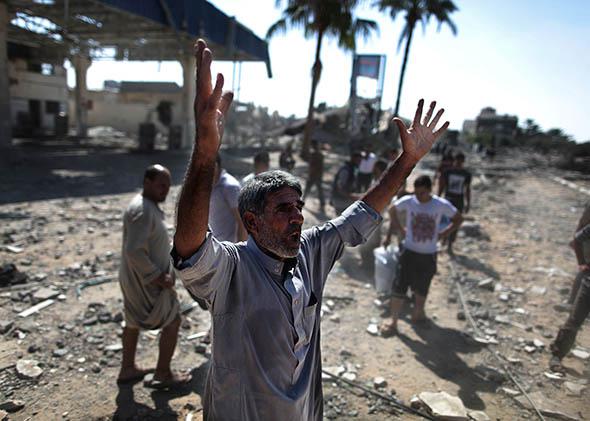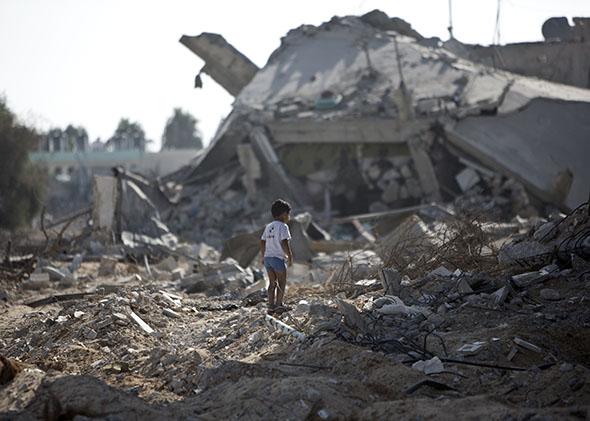The cease-fire in Gaza has exploded. Friday morning, around the time the shooting was supposed to have stopped, militants fought with the Israel Defense Forces and reportedly captured a soldier, Lt. Hadar Goldin. The IDF, in response, has shelled the area, killing many civilians. This is terrible news all around, though there’s a slim chance something good could come out of it. Here are the important points.
1. This is why you get out before things get worse. Hamas and its militant allies have made it obvious for weeks that what they wanted above all was to capture an Israeli soldier. They sent fighters out of their tunnels with handcuffs and tranquilizers. They tried to drag a wounded Israeli soldier back into a tunnel. When you’re winning a war (as when you’re winning at a casino or in the stock market), one of the hardest things to see is how good your current condition will look, in retrospect, if your luck suddenly runs out. Israel decided to push its luck, stay, and pursue its mission of destroying more tunnels. On Friday, its luck ran out.
2. This didn’t just kill the cease-fire. It killed the cease-fire process. If you’re Israel, you’re shaking your head and resolving never to get suckered into another deal. If you’re the United Nations, the United States, the Palestinian Authority, the deal-maker for Hamas, or one of the Arab or Western diplomats who struggled to put this deal together, you’re wondering how you can sustain a cease-fire when this or that cell or militia can decide unilaterally to trash your work for a military score. The most worrisome analysis of the Gaza militants isn’t that they’re coherently evil but that they’re too fragmented to sustain any kind of peace.
3. The abduction could be a result of vagueness in the deal. The terms of the three-day cease-fire, as stated by the United Nations and the United States, were that “during this time the forces on the ground will remain in place.” Israel said this meant that it could continue destroying tunnels. Hamas seems to have believed otherwise. Maybe diplomats used the “remain in place” language to fudge a difference of interpretations and this led to a confrontation in which the Israeli soldiers believed they had the right to continue their tunnel mission while the Gaza fighters thought they had the right to stop them. In other words, as a practical matter, the cease-fire was never really agreed to.

Photo by Mustafa Hassona/Anadolu Agency/Getty Images
4. This could get incredibly bloody. The last time an Israeli soldier was kidnapped by Gaza militants, in 2006, the abduction took place on the Israeli side of the border. The captive, Cpl. Gilad Shalit, was taken back into Gaza through a tunnel, and the abductors had a two-day head start to move and hide him before the IDF invaded Gaza. This time, the IDF is already inside Gaza, in the area where Goldin was taken. It’s possible for the IDF to seal and search the area, killing whoever gets in the way. That seems to be what’s happening, judging by the artillery fire and deaths in Rafah. I doubt the IDF will stop until it recovers its man or gets him killed. God knows how many civilians will die along the way.
5. The crisis empowers extremists on both sides. The diplomats who negotiated the deal look like impotent fools. The screamers on the Israeli right are getting the rampage they wanted. The dead-enders in Gaza are getting the bloodbath and Palestinian fury they wanted. Each side vindicates the other.
6. Something good could emerge from the crisis. It’s unlikely, but here’s how it could happen: The deal-makers on the Arab and Palestinian side somehow put the squeeze on the abductors to cough up Goldin. In exchange, the United States gets Israel to agree off the record to concessions regarding the issues that were to be discussed during the cease-fire. Arab intermediaries orchestrate the transaction so that Gazans feel they’re getting something in return, and Hamas can claim victory through negotiation. The mediators are re-empowered, and the cease-fire is restored. I’m not holding my breath.
